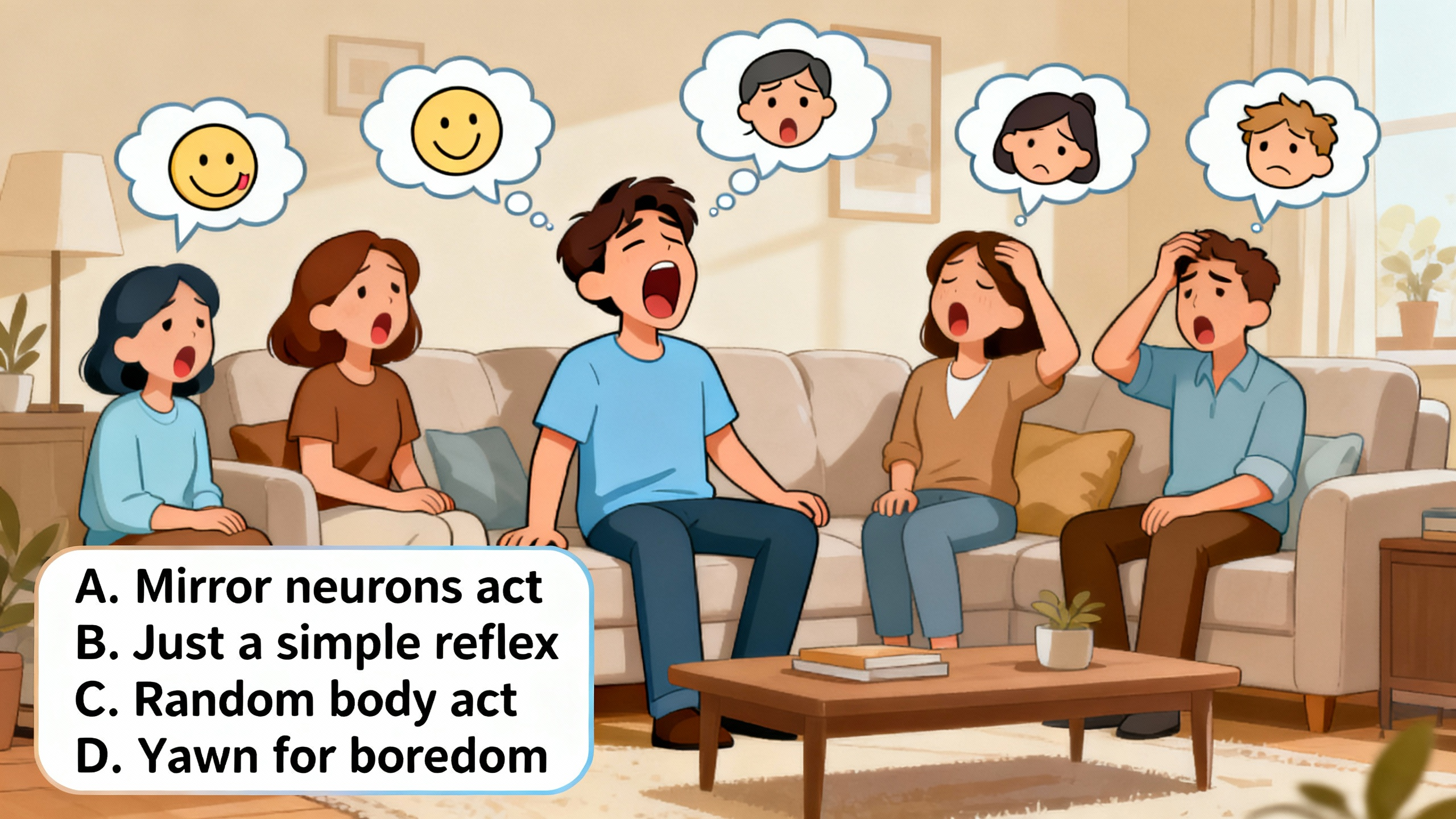The Correlation between Contagious Yawns and the Ability to Understand Others' Emotions
 In the fascinating realm of health science, the relationship between contagious yawns and the ability to understand others' emotions is a topic that has intrigued researchers for years. This correlation can be unraveled through several key theories, each offering unique insights into the complex nature of human behavior and social interaction. One of the most prominent theories in this context is the concept of empathy. Empathy is a fundamental aspect of human psychology, representing the capacity to understand and share the feelings of others. It allows us to step into someone else's shoes, perceive their experiences, and respond with compassion and understanding.
In the fascinating realm of health science, the relationship between contagious yawns and the ability to understand others' emotions is a topic that has intrigued researchers for years. This correlation can be unraveled through several key theories, each offering unique insights into the complex nature of human behavior and social interaction. One of the most prominent theories in this context is the concept of empathy. Empathy is a fundamental aspect of human psychology, representing the capacity to understand and share the feelings of others. It allows us to step into someone else's shoes, perceive their experiences, and respond with compassion and understanding.
Contagious yawning is believed to be an unconscious, primitive form of empathy. When we see someone yawn, a remarkable neurological process is set in motion. Our mirror neurons, which are specialized neurons in the brain, are activated. These mirror neurons have a unique property: they fire both when an individual performs an action and when they observe someone else performing the same action. This means that when we witness a yawn, our mirror neurons simulate the yawning action in our own brains, leading to a contagious yawn. It's as if our brains are automatically trying to replicate the experience of the other person.
To better understand the significance of mirror neurons in this process, let's take a closer look at how they function. Mirror neurons were first discovered in the 1990s by a group of Italian neuroscientists studying macaque monkeys. They noticed that certain neurons in the monkeys' brains would fire not only when the monkeys performed a specific action, such as grasping a peanut, but also when they watched another monkey perform the same action. This discovery was revolutionary, as it suggested that our brains have a built - in mechanism for understanding the actions and intentions of others. In the case of yawning, this mechanism allows us to vicariously experience what the other person is going through, even if it's just a simple yawn.
 People with higher levels of empathy are more likely to yawn contagiously because they are better at picking up on social cues and emotionally connecting with others. Empathy is not a one - size - fits - all trait; it exists on a spectrum. Some individuals are naturally more empathetic, while others may struggle to understand the emotions of those around them. For example, studies have shown that individuals such as children with autism spectrum disorder, who often have difficulties with empathy, are less likely to yawn contagiously compared to neurotypical children. Autism spectrum disorder is characterized by challenges in social interaction and communication, and a reduced ability to understand and respond to the emotions of others. This reduced empathetic ability is reflected in their lower likelihood of experiencing contagious yawns.
People with higher levels of empathy are more likely to yawn contagiously because they are better at picking up on social cues and emotionally connecting with others. Empathy is not a one - size - fits - all trait; it exists on a spectrum. Some individuals are naturally more empathetic, while others may struggle to understand the emotions of those around them. For example, studies have shown that individuals such as children with autism spectrum disorder, who often have difficulties with empathy, are less likely to yawn contagiously compared to neurotypical children. Autism spectrum disorder is characterized by challenges in social interaction and communication, and a reduced ability to understand and respond to the emotions of others. This reduced empathetic ability is reflected in their lower likelihood of experiencing contagious yawns.
Let's consider a real - life scenario to illustrate this point. Imagine a classroom full of students. A teacher yawns, and most of the neurotypical students start yawning in response. However, a student with autism spectrum disorder may not be affected by the teacher's yawn. This difference in response can be attributed to the varying levels of empathy among the students. The neurotypical students are more attuned to the social cues and the emotional state of the teacher, while the student with autism spectrum disorder may have difficulty picking up on these cues and connecting with the teacher's experience.
 Another aspect related to this correlation is the role of social bonding. Yawning is not just a physiological response to tiredness or boredom; it also has significant social implications. Contagious yawning can serve as a non - verbal signal that helps to synchronize the group's physiological states and strengthen social bonds. When we yawn in response to someone else's yawn, it indicates that we are attuned to the group's well - being and are in a state of social harmony. In a group setting, such as a family gathering or a team meeting, contagious yawning can create a sense of unity and connection among the members.
Another aspect related to this correlation is the role of social bonding. Yawning is not just a physiological response to tiredness or boredom; it also has significant social implications. Contagious yawning can serve as a non - verbal signal that helps to synchronize the group's physiological states and strengthen social bonds. When we yawn in response to someone else's yawn, it indicates that we are attuned to the group's well - being and are in a state of social harmony. In a group setting, such as a family gathering or a team meeting, contagious yawning can create a sense of unity and connection among the members.
Think about a sports team huddled together before a big game. One player yawns, and soon, several others follow suit. This chain reaction of yawning can have a calming and synchronizing effect on the team. It's as if they are all getting into the same mental and physical state, preparing for the upcoming challenge together. Understanding others' emotions is a fundamental part of social bonding. People who are more sensitive to the emotional states of others are more likely to engage in behaviors like contagious yawning, as they are more in tune with the social cues within the group.
Social bonding is essential for our overall well - being. It provides us with a sense of belonging, support, and security. In many animal species, similar forms of behavior are observed. For example, in wolves, yawning can be a way to maintain group cohesion. When one wolf yawns, others may follow, which helps to keep the pack in sync and aware of each other's states. In humans, contagious yawning may have evolved as a similar mechanism to strengthen social ties and promote cooperation within groups.
 There are also other factors that can influence the likelihood of contagious yawning. For instance, our level of fatigue can play a role. When we are tired, we may be more susceptible to contagious yawns. This could be because our brains are more easily influenced by the social cues around us when we are in a fatigued state. Additionally, our relationship with the person yawning can matter. We are more likely to yawn contagiously in response to someone we are close to, such as a family member or a friend, compared to a stranger. This is because we have a stronger emotional connection and are more attuned to their well - being.
There are also other factors that can influence the likelihood of contagious yawning. For instance, our level of fatigue can play a role. When we are tired, we may be more susceptible to contagious yawns. This could be because our brains are more easily influenced by the social cues around us when we are in a fatigued state. Additionally, our relationship with the person yawning can matter. We are more likely to yawn contagiously in response to someone we are close to, such as a family member or a friend, compared to a stranger. This is because we have a stronger emotional connection and are more attuned to their well - being.
Furthermore, cultural factors can also impact the prevalence of contagious yawning. In some cultures, yawning may be seen as a sign of disrespect or boredom, while in others, it may be more accepted and even considered a normal part of social interaction. These cultural attitudes can influence how individuals respond to seeing others yawn. For example, in a culture where yawning is stigmatized, people may be less likely to show a contagious yawn, even if they are empathetic and their mirror neurons are activated.
In conclusion, from a health science perspective, the correlation between contagious yawns and the ability to understand others' emotions is supported by the activation of mirror neurons related to empathy and the role of contagious yawning in social bonding. These factors together suggest that contagious yawning is not just a simple reflex but a complex social behavior deeply intertwined with our emotional and social intelligence. It offers a fascinating glimpse into the intricate ways in which our brains and bodies interact with the social world around us. By studying contagious yawning, we can gain a better understanding of human empathy, social bonding, and the neurological processes that underlie our social interactions.










